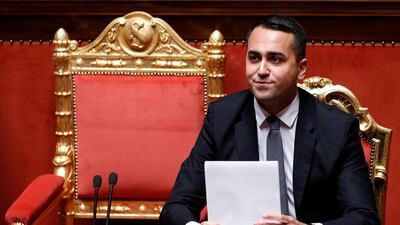Italy is considering the creation of a peacekeeping mission in Libya in an effort to preserve a shaky ceasefire in the conflict-ridden country.
Defence Minister Lorenzo Gueini said on Wednesday recent developments, including the supposed truce, meant Italy could rejig its military presence in Libya.
Italy already has troops on the ground in western Libya at a military hospital in the city of Misrata, just under 200 kms east of Tripoli. It also helped train the GNA's Presidential Guard and Libya's controversial coastguard.
"We could hypothesise an international intervention to give solidity to the security framework, respecting an eventual request for support made by the international community," he told Italy's parliamentary defence committee.
A Russian-Turkish brokered ceasefire was agreed last week between forces loyal to eastern-based Field Marshal Khalifa Haftar and fighters nominally operating under the Government of National Accord in Tripoli. Both sides have accused each other of violating the truce.
All eyes are on a conference hosted by Germany on Sunday that will be attended by host of world powers crucial to Libya’s fate. Both GNA Prime Minister Fayez Al Serraj and Field Marshal Haftar have been invited.
But there are fears that any mediating efforts could be in vain after the Field Marshal refused to sign a peace plan in Moscow on Monday.
Il Messaggero reported that the peacekeeping initiative is supported by Mr Serraj.
It compared the proposal to the United Nations Interim Force in Lebanon, which is headed by Italian Major General Stefano Del Col.
Italian Foreign Minister Luigi Di Maio has been credited with spearheading efforts to set up the mission. There is a belief that, while only the first step in a lengthy process, nothing can be achieved by the two Libyan sides are fighting.
Last week, Italy’s diplomatic prowess took a hit when Mr Serraj refused to meet with Prime Minister Giuseppe Conte after discovering the Field Marshal Haftar had also been invited to Rome.
The Field Marshal’s forces launched an attack on Tripoli in April, vowing to rid the capital of militias they claim control the city. But they have faced stiff resistance on Tripoli’s outskirts from an array of local armed groups, many of whom led the ousting of ISIS from the central-coastal city of Sirte in late 2016.
Sirte was seized by Field Marshal Haftar’s forces last week after a local militia controlling the city’s internal security switched to his side.
Mr Guerini, the Defence Minister, said Italian troops in Misrata some 200km’s to the west of Sirte were not in danger.
The Guardian reported that 2,000 Turkish-backed Syrian rebels have been or are about to be deployed to Libya to support the GNA.

